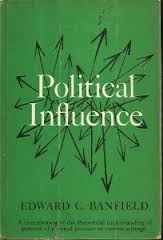New York: The Free Press of Glencoe, 1961/1982. A reprint with a new introduction by James Q. Wilson was published in 2003.
In government, influence denotes one’s ability to get others to act, think, or feel as one intends. A mayor who persuades voters to approve a bond issue exercises influence. A businessman whose promises of support induce a mayor to take action exercises influence. In Political Influence, Edward C. Banfield examines the structures and dynamics of influence in determining who actually makes the decisions on vital issues in a large metropolitan area. Banfield locates his analysis in Chicago, focusing on a broad range of representative urban issues. An introductory chapter defines Banfield’s method through four leading questions: Who has influence and who is subject to it? How does influence work? What are the terms upon which influence is expended? How is action concerted by influence?
“Although the discussion is confined to Chicago, and Professor Banfield is careful to limit his generalizations to that scene, the analysis is nonetheless of general interest, and many of the conclusions have application to any large urban area and to some extent to the political process generally. It is a very good book.” — Preble Stolz
Online:
Scribd [pdf]
Amazon
Amazon (reprint)

